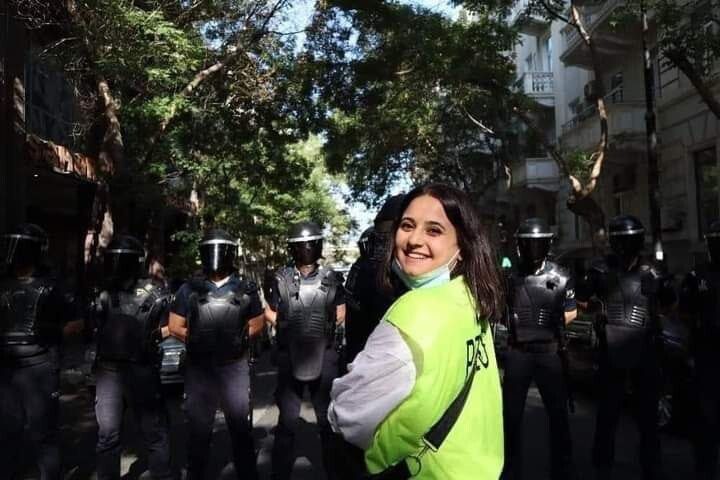Overview
For more than ten years, Azerbaijani authorities have been closing space for civil society. NGOs have been arbitrarily shut down and civil society representatives and journalists arrested or forced into exile.
Azerbaijani authorities have faced international criticism for their alleged torture and other ill-treatment of some government critics. In some cases, individuals suffering from worsening health in prison are denied access to adequate health care. In addition, relatives and family members of government critics have also been targeted, either by smear campaigns or by the freezing of their assets through financial sanctions.
The authorities also adopted restrictive laws excessively regulating the work of media and NGOs in recent years, while peaceful protests in Azerbaijan have been severely restricted for over a decade.

For more than a decade, Azerbaijani authorities have been restricting space for civil society
Help us Release Journalists and Activists in Azerbaijan
How has COP29 affected the situation?
The UN climate change conference (COP29) taking place in Baku in November 2024 will put Azerbaijan in the global spotlight. Since Azerbaijan was announced as the host of COP29 last December, the authorities have intensified their crackdown on civil society on the rights to freedom of expression, association and peaceful assembly. Independent civil society organizations remain closed and critics have been locked up under politically motivated charges or forced into exile.
Azerbaijani human rights defenders estimate that approximately 300 people remain in detention on politically motivated charges. These include human rights defenders, journalists, and environmental, political and other activists prosecuted under fabricated and/or politically motivated charges in retaliation for their criticism of the authorities.
The participation of activists and civil society is vital to ensure effective discussions at COP29. The crackdown in Azerbaijan means that human rights cannot be respected, and climate justice cannot be served.

Individual cases
Anar Mammadli – Freedom of Association

Anar Mammadli is a prominent human rights defender and climate advocate who pushed for the involvement of civil society in COP29, including as a co-founder of the Climate Justice Initiative. He was arrested on 29 April 2024 and placed in pre-trial detention.
On 29 April 2024, Anar Mammadli was on the way to pick up his child from nursery when he was apprehended by unidentified masked men and driven away in a black vehicle. According to family members, police then searched Anar’s house and allegedly planted money.
He faces fabricated charges of conspiracy to unlawfully bring money into the country. If convicted, he faces up to eight years in prison. Anar previously spent almost two years in prison for his human rights work and was released in 2015.
Nargiz Absalamova – Freedom of expression

The journalist Nargiz Absalamova is a journalist at Abzas Media. She was arrested on1st December 2023 on charges of money smuggling. Nargiz denies any wrongdoing. According to her lawyer, she was not outside Azerbaijan during the time of the alleged smuggling.
Absalamova is the fourth member of Abzas Media to be held in pretrial detention on money-related charges since police said they found 40,000 euro during a raid on the outlet’s office.
As a journalist, Absalamova has experienced police violence and harassment. In 2021, while covering a feminist protest, she and her colleagues were detained by police officers. In December 2022, during a protest against a new “On Media” law the authorities had announced, she was beaten by police, resulting in a broken collarbone.
In June 2023, Nargiz was sent to cover law-enforcement repression against demonstrations against a a gold mine in Soyudlu. The inhabitants of the village accused the authorities of poisoning the water. The police briefly seized her phones before expelling her and other journalists from the village, and preventing independent coverage of the protests.
Along with her colleagues at Abzas Media, Nargiz has now spent more than ten months in a pre-trial detention centre. She is being wrongfully held on trumped up charges.
Torture and ill treatment in prisons
Allegations of torture and other ill-treatment in detention are widespread in Azerbaijan, committed with impunity by police and members of other investigating agencies. Those suspected to be responsible are almost never brought to the justice. There is no independent complaints mechanism and no access to justice and effective remedies for the victims. Almost all government critics routinely report being subjected to torture and other ill-treatment in detention. These allegations are not effectively investigated.
On 3 July, 2024, The Council of Europe’s Committee for the Prevention of Torture and Inhuman or Degrading Treatment or Punishment (CPT) publicly denounced Azerbaijan’s “refusal to improve the situation in the light of the Committee’s recommendations” and “persistent lack of cooperation of the Azerbaijani authorities with the CPT”. In the report published alongside the statement, the Committee expressed extreme concern regarding longstanding and widespread resort to physical ill-treatment (including, on occasion, torture) by the police.
Government critics are often denied adequate health care in detention, resulting in the worsening of their health or pre-existing medical conditions.


